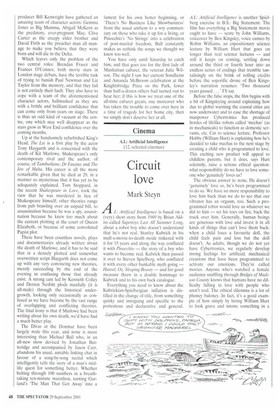Circuit love
Mark Steyn
A.1: Artificial Intelligence is based on a (very) short story from 1969 by Brian Aldiss called Supertoys Last All Summer Long, about a robot boy who doesn't understand that he's not real. Stanley Kubrick in his mull-a-movie-to-death mode tinkered with it for 15 years and along the way conflated it with Pinocchio — the story of a boy who wants to become real. Kubrick then passed it over to Steven Spielberg, who conflated it with every other bankable myth going — Hansel, 0z, Sleeping Beauty — and for good measure threw in a double hommage to Kubrick and to his own back catalogue.
Everything you need to know about the Kubrickian-Spielbergian inflation is distilled in the change of title, from something quirky and intriguing and specific to the portentous and declarative and general.
A.1: Artificial Intelligence is another Spielberg exercise in B.S.: Big Statement. The film has everything a Big Statement movie ought to have — score by John Williams, voiceover by Ben Kingsley, voice cameo by Robin Williams, an expositionary science lecture by William Hurt that goes on longer than real science lectures — and still it keeps on coming, settling down around the third or fourth hour into an endless series of endings that tremble tantalisingly on the brink of rolling credits before the soporific drone of Ben Kingsley's narration resumes: 'Two thousand years passed ... ' I'll say.
Before the false stops, the film begins with a bit of Kingsleying around explaining how due to global warming the coastal cities are now underwater and to ease the shortage of manpower Cybertronics has produced hordes of lifelike robots called `mechas' (as in mechanicals) to function as domestic servants, etc. Cut to science lecture. Professor Hobby (William Hurt) is explaining how he's decided to take mechas to the next stage by creating a child who is programmed to love. This exciting new product will appeal to childless parents, but it does, says Hurt solemnly, raise a serious ethical question: what responsibility do we have to love someone who 'genuinely' loves us?
The obvious answer is: none. He doesn't 'genuinely' love us, he's been programmed to do so. We have no more responsibility to love him back than we do to see that our vibrator has an orgasm, too. Such a programmed robot would love us whatever we did to him — set his toes on fire, back the truck over him. Generally, human beings are generous with love and invest it in all kinds of things that can't love them back: when a child loses a favourite doll, the child feels pain and loss but the doll doesn't. As adults, though we do not yet have Cybertronics, we regularly develop strong feelings for artificial, mechanical creations that have been programmed to activate our emotions. They're called movies. Anyone who's watched a female audience snuffling through Bridges of Madison County knows that humans have no difficulty falling in love with people who aren't real. The ethical dilemma is a lot of phoney baloney. In fact, it's a good example of how simply by hiring William Hurt to look grave and intone something in a flat unmodulated voice, you can programme humans to respond to any old hooey seriously.
So on comes the first mecha who can be programmed to love, David, played by Haley Joel Osment. Taken home by Monica and Henry, he fits in with the household's routine while not partaking of it. He can do without sleep, but he lies down in his room at night. He doesn't require food, but he sits at the table. He has no need to urinate and, when this is cause for teasing, it leads to a spat in which he and his real brother Martin fall into the pool and Spielberg pulls off a memorable moment. It's Martin that mom and dad rush to rescue, diving in, fishing him out, frantically resuscitating him, while ignored, forgotten David sinks to the bottom of the pool and lies there on the tiles blankly staring upward. David understands that he's not 'real', that under his skin he's a mass of circuits, but he tries to express his love by distancing himself from his teddy bear (another walking, talking mecha, though a more primitive model): 'Dear Mommy, I am your little boy and so is Martin but not Teddy ... ' Personally, I found Teddy far more engaging than any of the human or humanoid characters.
Spielberg, a master manipulator, doesn't seem quite sure where to point us: David is creepy and obsessive — especially when compared to Pinocchio — and the parents are unlikeable, and, just to emphasise the point, Spielberg and his cinematographer Janusz Kaminski eschew the usual goldenhued sun-dappled domestic interiors for cool, diffused, blue tones that have the unfortunate side effect of being virtually trance-inducing. I don't believe the film ever recovers from this, though Jude Law as a mecha male prostitute servicing lonely women temporarily jollies things up.
In America. A.I. was a box-office dud, much to the chagrin of the critics who hailed it as a masterpiece. But then it's a film only critics would love, and Spielberg all but programmed them to do so. The Kubrick-to-Spielberg thing helped, ensuring reviewers would be on the look-out for any trace of the late genius which would enable them to show off their knowledge of his oeuvre. And, whaddayaknow, canny old Spielberg seems to have found room for a nod to just about everything Kubrick ever did — here an allusion to Strangelove, there a frisson of Clockwork Orange. But Spielberg doesn't stop there: Blade Runner, Cabaret, Planet of the Apes .. . Even the good-natured broken-down mechas scavenging in the woods seem like hobos from a Warner Bros Depression pie. In their Spielbergian reworking, the bum mechas don't scavenge for stogies but for spare parts — the mangled arms and cast-off eyeballs of other busted-up robots — and in its way it's the perfect image for a Frankenfilm constructed from bits of every other film without ever developing a life of its own. It also seems strangely dated: with
human cloning pretty much underway in some Mexican or Moroccan clinic, the distinction between humanity and whatever comes next is far less obvious than wiring and an inability to pee.







































































 Previous page
Previous page